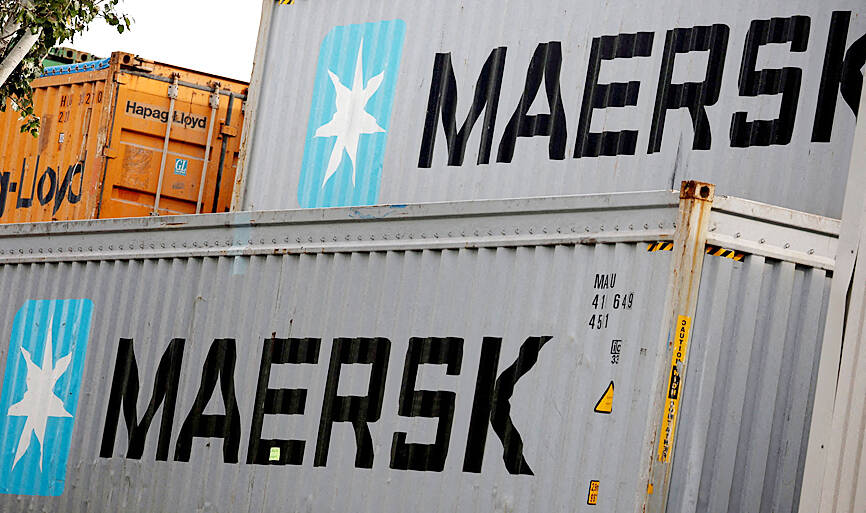Shipping giant A.P. Moller-Maersk A/S reported yesterday a massive drop in net profit for last year and warned of “uncertainty” for this year due to Yemeni rebel attacks on vessels in the Red Sea.
An oversupply of container shipping last year caused prices to drop after they had soared in 2022 due to capacity shortages amid high demand following the end of COVID-19 pandemic restrictions, the Danish group said.
“The high demand eventually started to normalize as congestions eased, and consumer demand declined leading to an inventory overhang,” Maersk said in its annual earnings report.

Photo: REUTERS
This “correction” resulted “in rapid and steep declines in shipped volumes and rates starting” at the end of the third quarter of 2022, it added.
Maersk said its net profit reached US$3.8 billion last year, slightly more than forecast by analysts but down sharply from the US$29.2 billion logged in 2022.
Its revenue was also slightly above forecasts, reaching US$51 billion compared to US$81.5 billion the previous year.
The “oversupply challenges” in the maritime shipping industry are expected to “materialize fully” over the course of this year, Maersk said.
The group lowered its forecast for its core profit for this year — earnings before interest, tax, depreciation and amortization — to a range of between US$1 billion and US$6 billion.
“High uncertainty remains around the duration and degree of the Red Sea disruption with the duration from one quarter to full year reflected in the guidance range,” Maersk said.
Maersk's stock price sank more than 13 percent on the Copenhagen stock exchange after the release of the earnings report, which also included the announcement of the suspension of its share buyback plan.
Chairman Robert Maersk Uggla and CEO Vincent Clerc said in the earnings report that "2023 ended with multiple distressing attacks on cargo ships in the Red Sea and the Gulf of Aden".
They noted that two of the company's ships had been targeted.
"We are horrified by the escalation of this unfortunate conflict," they said.
Maersk and other shipping companies have decided to redirect shifts away from the Red Sea, making them take the longer and costlier route around the southern tip of Africa.
The Red Sea usually carries about 12 percent of global maritime trade.
Yemen’s Iran-backed Huthi rebels have targeted ships crossing the Red Sea since last year, saying their campaign was in solidarity with Palestinians in the war between Israel and Hamas.
"While the Red Sea crisis has caused immediate capacity constraints and a temporary increase in rates, eventually the oversupply in shipping capacity will lead to price pressure and impact our results," Clerc said.
Maersk also announced it would spin off its towage business, Svitzer, as a separate listed company.

Intel Corp chief executive officer Lip-Bu Tan (陳立武) is expected to meet with Taiwanese suppliers next month in conjunction with the opening of the Computex Taipei trade show, supply chain sources said on Monday. The visit, the first for Tan to Taiwan since assuming his new post last month, would be aimed at enhancing Intel’s ties with suppliers in Taiwan as he attempts to help turn around the struggling US chipmaker, the sources said. Tan is to hold a banquet to celebrate Intel’s 40-year presence in Taiwan before Computex opens on May 20 and invite dozens of Taiwanese suppliers to exchange views

Application-specific integrated circuit designer Faraday Technology Corp (智原) yesterday said that although revenue this quarter would decline 30 percent from last quarter, it retained its full-year forecast of revenue growth of 100 percent. The company attributed the quarterly drop to a slowdown in customers’ production of chips using Faraday’s advanced packaging technology. The company is still confident about its revenue growth this year, given its strong “design-win” — or the projects it won to help customers design their chips, Faraday president Steve Wang (王國雍) told an online earnings conference. “The design-win this year is better than we expected. We believe we will win

Chizuko Kimura has become the first female sushi chef in the world to win a Michelin star, fulfilling a promise she made to her dying husband to continue his legacy. The 54-year-old Japanese chef regained the Michelin star her late husband, Shunei Kimura, won three years ago for their Sushi Shunei restaurant in Paris. For Shunei Kimura, the star was a dream come true. However, the joy was short-lived. He died from cancer just three months later in June 2022. He was 65. The following year, the restaurant in the heart of Montmartre lost its star rating. Chizuko Kimura insisted that the new star is still down

While China’s leaders use their economic and political might to fight US President Donald Trump’s trade war “to the end,” its army of social media soldiers are embarking on a more humorous campaign online. Trump’s tariff blitz has seen Washington and Beijing impose eye-watering duties on imports from the other, fanning a standoff between the economic superpowers that has sparked global recession fears and sent markets into a tailspin. Trump says his policy is a response to years of being “ripped off” by other countries and aims to bring manufacturing to the US, forcing companies to employ US workers. However, China’s online warriors